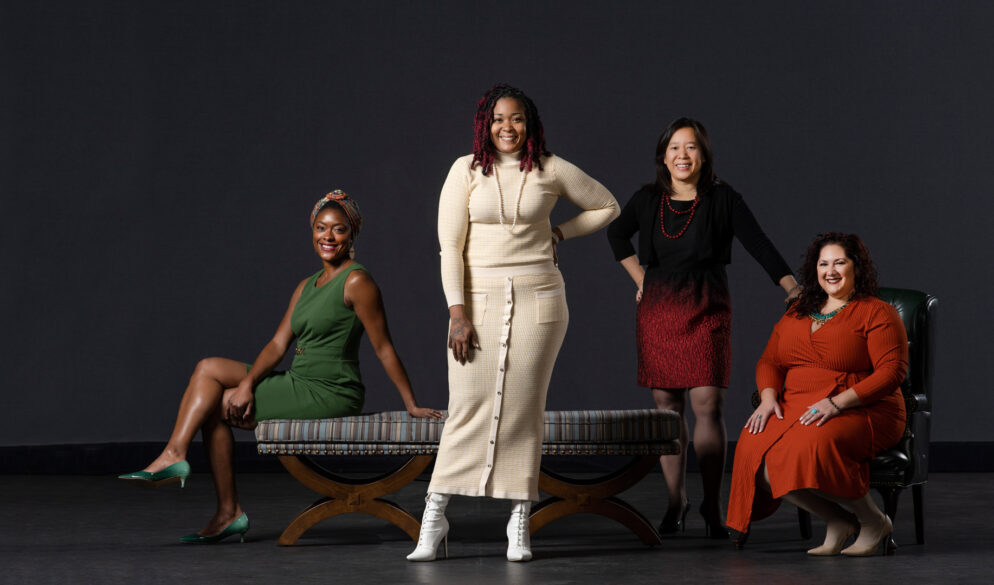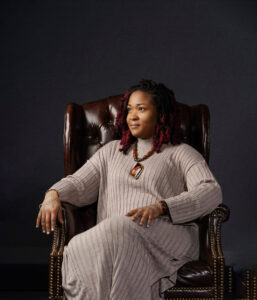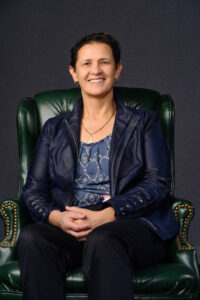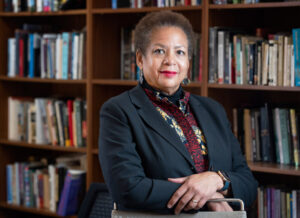But: ‘We Should Speak Frankly About the Barriers That Still Exist’
The leadership at Colorado College has changed dramatically throughout the years, and now, in the 2021-22 academic year, the college has never had as many feminine-identifying, Black, Indigenous, people of color voices as it does now. While this is an enormous success for Colorado College as a small, liberal arts college, the work always continues. As the CC community takes a moment to acknowledge how far it’s come, the BIPOC women in leadership roles know there’s still a long way to go.
Heidi R. Lewis, director and associate professor in the Feminist and Gender Studies program, as well as the inaugural coordinator of the Early Career Faculty Development Program, knows just how far we’ve come and how much work needs to happen in the future. While the administrative makeup of Colorado College is unique, Lewis is interested in how that uniqueness will translate into long-term change within the college — whether the trend of BIPOC women in leadership roles will continue to fill and grow, or if we run the risk of becoming comfortable with the diversity we already see.
While she admits enthusiasm for the changes of who’s represented in administration is exciting and acknowledging the advances is certainly important, Lewis is clear that we are congratulating ourselves prematurely. For Lewis, even though the challenge of changing the culture of the college’s leadership and student makeup is far from easy or over, even more challenges lie ahead with the retention of the BIPOC female leadership in both the faculty and staff.
“We have to continue to hire and retain faculty, staff, and administration, and admit students with marginalized identities, and retain them by any means necessary,” she says. “We have to relearn or unlearn the ways that we’ve come to understand excellence and quality and see BIPOC women as a source of brilliance where we haven’t seen it before.”
For Lewis, the problem not only exists with finding the individuals to fill these roles and have success in them but staying in these leadership positions to enact real, meaningful change for other BIPOC faculty, staff, and students. In Lewis’ role at CC directing the Riley Scholars-in-Residence Program, she understands these needs in a unique, powerful way.
Manya Whitaker, associate professor of education, acting executive vice president, and chief of staff, also sees the change occurring within the administration at CC and knows there’s much more to be done. While Colorado College might be changing in the direction of representation, and while this is unique at CC, these changes are happening across the country at other similar, small liberal arts institutions. While opportunities seem to be opening for BIPOC women, and while overall diversity seems to be moving in the favor of Colorado College advancing from our past, Whitaker asks an important question: “Why now?”
While “representational diversity looks good on pamphlets,” she understands better than most that “we need leadership — regardless of demographics — to have the power and authority to effect meaningful change.” When we have BIPOC women in these roles, what support is the college giving them to ensure they’re successful? To ensure they want to lead at CC, to be a part of the change the community is trying to enact? Whitaker asks these questions and more, with an optimism that perhaps CC is willing to fight for these women and put in the work so that they can find true success in leading at the college. But for now, Whitaker believes that “we are certainly congratulating ourselves prematurely.”
The leadership roles at CC filled by BIPOC women do not end at faculty leadership. Maggie Santos ’86, former director of Campus Safety and Emergency Management, sees the change in leadership from a unique staff perspective. Since her recent retirement, Santos has continued to assist CC as COVID response manager. With her background in law enforcement and emergency management at Colorado College, Santos has met with other higher education safety officers and noticed the lack in both women’s representation and BIPOC women’s representation.
When Santos began her career 25 years ago, she says, “I was the first BIPOC woman to be promoted to sergeant and then lieutenant. Coming to Colorado College was an amazing change, both being around leadership filled with BIPOC women and the large number of BIPOC women on campus. It has been an amazing and emotionally uplifting change coming from my previous career.” But, like most of the women in leadership roles, there is still more to be done. For Santos, BIPOC women deserve more support systems, mentoring, and opportunities.
When Associate Vice President of Facilities Services Amber Brannigan started at CC in August 2020, the college had just gone into quarantine mode and had to quickly implement systems and processes to deliver meals to isolated students by campus volunteers wearing full PPE. Brannigan was staying on campus then because she hadn’t purchased a house yet; she participated and saw the situation up close.
“As it happened, there were more volunteers who showed up to work than there were PPE suits available. It was one of those moments where you say, ‘This is where I want to be.’”
Another factor that made Brannigan happy to be at CC, she says, was the overall diversity on campus and commitment to becoming an antiracist institution.
“It’s been encouraging to meet colleagues and leaders at CC who are truly representative of the population at large.”
Brannigan serves on the Antiracism Commitment Committee, which meets blockly.
“The diversity in the room is impressive, as is the work,” she says. “We are working to address conscious and unconscious bias, to find equitable platforms for hiring, to update our job descriptions. We’re getting creative and deliberate with the areas we target to recruit and retain BIPOC. In other words, the way we did things isn’t necessarily the way we will keep doing things in the future. I’m encouraged that we’re willing to ask and answer all these questions. We’re actively finding ways to ingrain antiracism in our practices.”
An employee climate and engagement survey was conducted on campus in late 2021, and the college shared results with employees in 2022. The survey asked employees how they feel about their sense of well-being at work; the college’s mission, values, and direction; the shared-governance model we rely upon in making many decisions; and the stewardship and shaping of the campus culture among other things. Brannigan said she found this process powerful.
“The willingness on the part of leadership to identify opportunities for improvement — so often, these social expectations are pushed to the side, especially when you’re working under constraints like tight budgets or a pandemic. But here, they remain at the forefront and we’re actively working to get things done. There are absolutely some challenges, but we’re not just talking about it.”
With a unique administrative faculty perspective, Claire Oberon Garcia — professor of English, former dean of the faculty, and former acting provost — knows that for discrepancies in leadership representation roles to diminish in higher education, “we should speak frankly about barriers that still exist.”
For Garcia, many of her concerns lie with the challenges BIPOC women face once they’re in these leadership roles and the treatment, challenges, and biases that follow. From her experience as the dean of faculty and the acting provost, Garcia can see that “effective leadership is contextual, conversational, and collaborative rather than individualistic and hierarchical. Effective leaders need to make themselves vulnerable in ways that some may interpret as not being ‘strong’ or ‘decisive.’”
From this, Garcia becomes concerned with the biases that exist in higher education and the general workforce when BIPOC women assume roles of leadership — especially about qualifications. Garcia knows that when these women stray from what others conventionally see as “strong” and “decisive,” it instills doubt about their skills or authority. If you do things differently, do you really know what you’re doing? Garcia says she has noticed when BIPOC women in these leadership roles aren’t given the confidence, trust, and benefit of the doubt that white individuals in similar roles are given, questions arise about whether a BIPOC person is truly qualified.
Garcia’s scholarship in Black studies and DEI issues has allowed her to see the problems from an informed administrative perspective. With her current work initiating changes to implement the college’s antiracism commitment to enable all members of the school’s community to be heard and thrive — things do seem, in some ways, to be looking up.
“I used to feel that headhunters who called me about leadership opportunities were just interested in putting together a compositionally diverse pool,” she says, “but now, I see more and more BIPOC women actually being hired into leadership positions from a diversity of professional and experiential backgrounds.” Garcia says she’s beginning to feel higher educational institutions are looking for more than just faces on a pamphlet or numbers in a statistic. Instead, these institutions are looking for those who are excited to enact change and challenge the current ways of thinking and are beginning to broaden what is considered relevant experience for leadership roles, encouraging more BIPOC women to fill these spaces.
As things look up for higher education and Colorado College in the lens of BIPOC women assuming significantly more leadership roles, it’s important for the college and its antiracism initiative to hear what these women know must happen for this change to continue—with longevity—toward a more equitable future. Colorado College has come a long way, and there’s pride to be had in the current leadership representation, but the work certainly continues.





